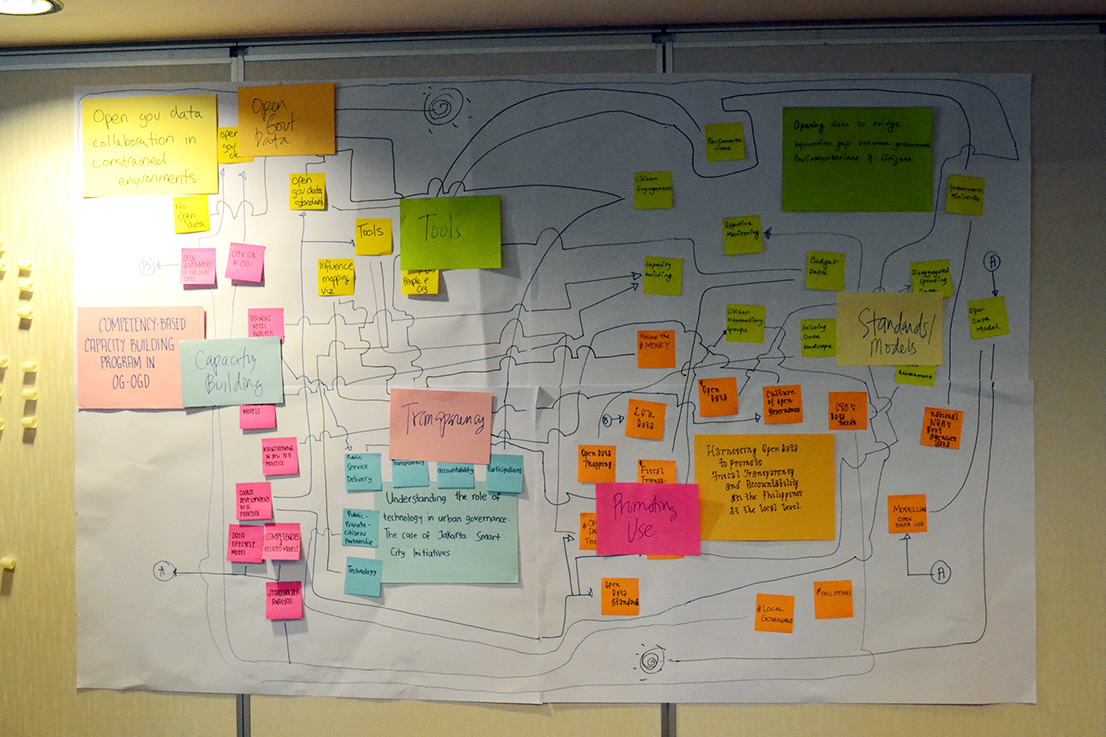Last week saw a packed agenda for the Jakarta Lab team: we engaged with open data activists from Malaysia and Indonesia at an event hosted by SEATTI, explored the potential of open data as a tool to promote financial transparency at the 6th Financial Transparency conference, and hosted our own regional research planning workshop with partners from Indonesia, Malaysia, Nepal and the Philippines.
In this blogpost we list five of the most interesting lessons we learned or shared last week:
- Open data can be complicated. Its analysis and interpretation require knowledge of databases, data management, standards, tools and, most importantly, substantive subject matter expertise. Events and workshops like those we were part of last week bring together people from different backgrounds, with different sets of skills. They don’t always speak the same language, nor do they always agree on the most effective solutions to a problem – sometimes not even on what the actual problem is. However, some insights can only be gained by pooling expertise, and some strategies only developed by bringing in a broad mix of skills and capacities. This is also true for the financial transparency sector as we have experienced first hand in our work on local level budget transparency, government contracts and asset declarations where data skills are needed, along with a good understanding of the context of the data and an appreciation of roles and stakeholders.With the action research project we are undertaking with the Center for Local and Regional Governance of the University of the Philippines, we now seek to develop new approaches of bringing together the various financial data communities for joint action.
- Working with a number of local and national governments, we learned first hand that Government should not be seen as a single and largely homogenous actor with a shared collective interest and a unified approach on data sharing. Differences can be observed not only from one jurisdiction to another, but also within a single local government, a department or even a unit. Some government officials are more open to the idea of sharing data, the reasons for which can be manyfold – from a genuine commitment to an open and responsive government, to understanding open data as an opportunity to boost their reputation as a progressive reformer. Understanding the priorities, incentives as well as constraints of bureaucrats is key in understanding Government as a creature of many faces, something our research partners from Young Innovations have embarked on by working closely with agriculture ministry officials, members of parliaments and civic groups in Nepal.
- Closely related to point 2, but worth a separate paragraph as it keeps coming up in conversations, is the question whether governments are unwilling or simply unable to provide access to data. The large majority of government partners we’ve engaged with face capacity constraints and lack of quality data making it difficult for them to undertake well-resourced and sustainable open data initiatives that go beyond a dedicated one-time effort. Adequate policies are missing, budget priorities do not allow for sufficient funding of open data programs, and trained staff are rare – a gap the Open Data Educational Resource Institute project seeks to fill through a competency-based capacity-building program. However, this is based on our engagements with a small number of local governments, and there certainly are examples of government able but not willing to open up. So the challenge is to understand whether the decision of governments not to disclose data is based on capacity constraints, data quality issues, or their political agenda – and to then devise appropriate strategies to convince, support or, if required, enforce access to data through legal means.
- …which leads to point 4: the need for broadening perspectives on the various ways to access and collect data. All too often, advocacy groups focus on one approach while ignoring others. For instance, despite the recent convergence of the open data and Freedom of Information (FoI) communities, there remains a lack of understanding and appreciation of each other’s methods and tools. Our work in Banda Aceh with government and civil society, however, shows that FoI legislation has laid the institutional foundations for open data. Whether open data will spur greater demand for government information and use of FoI mechanisms, and whether open data programs increase the responsiveness of Government in responding to FoI requests remains to be seen. But even where open data programs and FoI legislation are absent, there are ways to collect data and put it to work as our research partners from the Sinar project have demonstrated and continue investigating in Malaysia.
- Just like there is a need to consider employing both reactive and proactive disclosure mechanisms, or alternative approaches to data collection, there is a need to view data from government as only one piece in the puzzle of making government more effective and responsive. For instance, the provincial government of Jakarta has been experimenting with new ways of including private sector and citizen-generated data in their work. Prominent examples include the crowdsourcing navigation app builder Waze and the flood reporting platform Peta Jakarta. However, questions remain as to who benefits in what ways from such data-sharing mechanisms, in how far Government is really using the data for better policy-making, and if such data can be made accessible so that the general public can reuse it. These are the type of questions our partners from the Center for Innovation for Policy and Governance in partnership with Jakarta’s Smart City program have started to shed light on.
We will soon be sharing more details on the action research projects we have embarked on with partners from across the region, as well as a summary of the research planning workshop. In the meantime, we’d be happy to hear from you and learn about your experiences. Meet us at this week’s Open Government Partnership conference in Mexico or find us on Twitter.


Leave a Reply